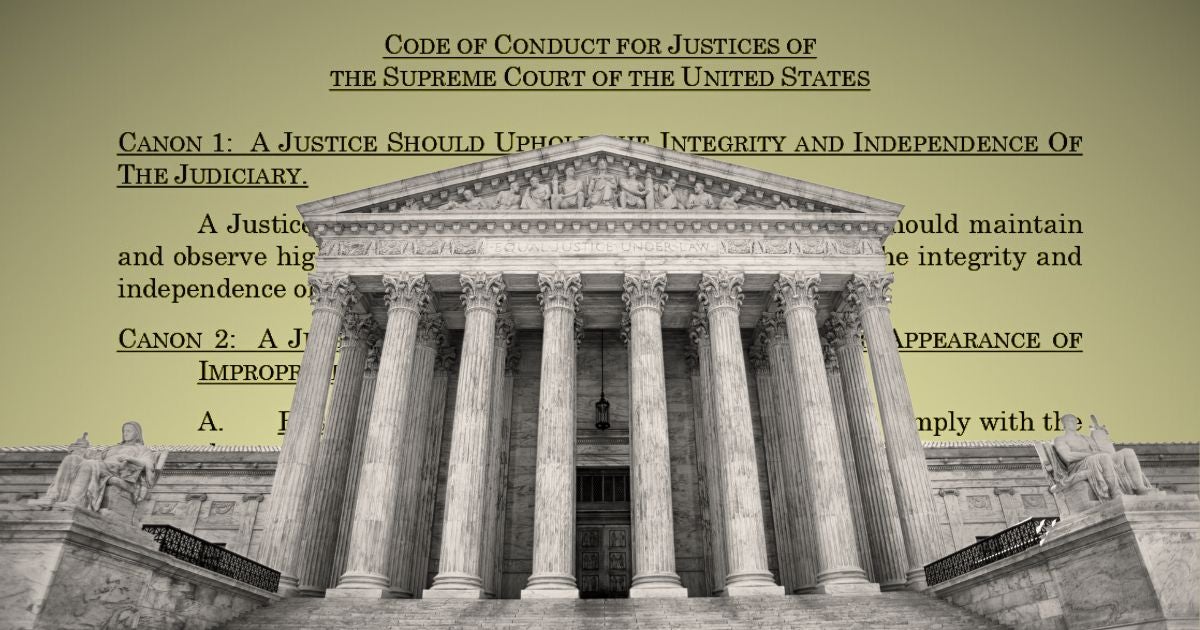
by First Liberty Institute • 4 min read
This week, the U.S. Supreme Court adopted a formal code of conduct for the first time in its history. It codifies in one document the standards the court has long held. The decision comes after months of scrutiny and pressure from some politicians who claim that justices on the Court have violated ethics standards.
The Court issued a 15-page document that includes five canons of conduct on issues such as when justices should recuse themselves and what outside activities they may engage in. It requires Supreme Court justices to hold to the highest standards and refrain from any political activity while in office, or else be disqualified from their seats. All nine justices signed the policy.
Not surprisingly, the Court’s most vocal critics are not satisfied. They argue the Court needs even more oversight and accountability from Congress.
“This is a long-overdue step by the justices, but a code of ethics is not binding unless there is a mechanism to investigate possible violations and enforce the rules,” according to Sen. Sheldon Whitehouse of Rhode Island.
The response to the Court’s efforts make clear what this is really about: One side trying to wrest control of the Supreme Court.
From the very beginning, First Liberty explained that Americans are witnessing a fabricated scandal. These attacks have largely been directed against Justice Clarence Thomas—the Court’s leading conservative and one of the foremost defenders of religious liberty—and other conservative members of the Court. But while the Left has kept up a steady stream of accusations against conservative-appointed justices, it has largely ignored similar activities by liberal-appointed justices.
First Liberty President and CEO Kelly Shackelford—joined by former U.S. Attorney General Edwin Meese—wrote in The Wall Street Journal: “Liberals are trying to subvert the legitimacy of the Supreme Court because it contains a majority of justices committed to the Constitution and the rule of law.”
Michael Mukasey, who served as U.S. Attorney General and a federal judge, echoed that sentiment. He said the public is being asked to hallucinate misconduct in order to create a cloud of doubt. Former U.S. Solicitor General Paul Clement—who’s argued more than 100 Supreme Court cases—warned that attacks on the judiciary are “incredibly dangerous” because if you study the Supreme Court through history, “Its legitimacy has to be built up over time. And it’s been a careful effort that has literally taken centuries.”
Americans who cherish and value our nation’s judicial system should not be deceived. Don’t be fooled by those who say this is about fixing a “broken” Court. It’s not.
Make no mistake. Any ethics code other than one adopted by the Supreme Court is just one piece of a larger plan to orchestrate a Supreme Court Coup. And if radicals on the Left get their way on this, it won’t be long before we see a renewed push for other dangerous and constitutionally suspect proposals such as court-packing, judicial term limits or even ending the court’s power of judicial review.
RELATED NEWS:
Wall Street Journal: The Supreme Court’s New Ethics Code. The substance is fine, but the partisan critics won’t be appeased.
Fox News: Supreme Court adopts modified ethics code after pressure from Hill Dems
National Review: Supreme Court Adopts First Code of Ethics amid Democratic Scrutiny
Washington Examiner: Supreme Court will adopt an ethics code
The Daily Wire: Supreme Court Reveals Ethics Code For Justices
Daily Signal: Senate Democrats’ Supreme Court ‘Ethics’ Bill Is Really About Disapproval of Rulings
Heritage Foundation: Is the Supreme Court in an Ethics Crisis?